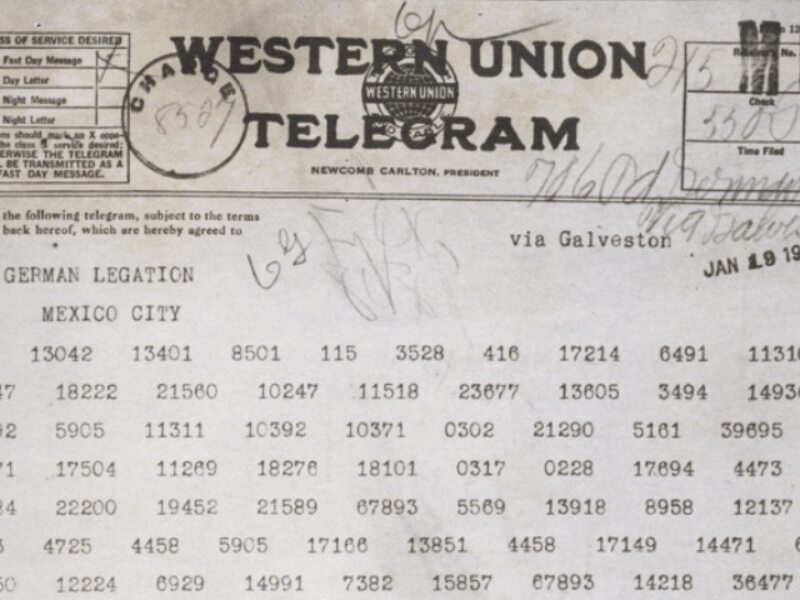The United States’ entry into World War I was uncertain from the start. At least since the time of President James Monroe, these citizens have avoided getting involved in “European adventures.” At the outbreak of World War I, the US remained a neutral country.
The American approach to the European conflict, as initially assumed, changed on May 7, 1915, when a German U-boat sank the Lusitania with more than two thousand people on board. However, even if such information can be found, this tragedy was not the direct cause of the US joining the war on the side of the Entente. The situation on the world war map changed only with the establishment of relations between Germany and Mexico.
Zimmerman Telegram
The change in US approach to the Great War was only telegraphed in early 1917. At that time, British intelligence obtained the so-called Zimmermann Telegram. The contents are as follows:
“Berlin to Washington. W 158. 16 January 1917. Top Secret. For exclusive information to Your Majesty, and for transmission to the Imperial Plenipotentiary in Mexico via secure means of transmission. On 1 February, we will begin unrestricted submarine warfare However, we will try to keep America neutral… (?) If we fail to achieve this, we propose to (Mexico) an alliance based on the following principles: (together) wage war, (together) make peace. His Majesty would like to inform the President in strict tact for now [Meksyku]that we expect war with the US. (Possibly) (Japan) and meanwhile negotiating between us and Japan… Tell the President that our submarines… will compel Britain to make peace within months. Confirm acceptance.”
This message was delivered to US President Woodrow Wilson only after a few weeks (at that time the telegram was being decrypted). The cable contained instructions from German Foreign Minister Arthur Zimmerman to Reich envoy to Mexico Heinrich von Eckhardt. Zimmermann offered an alliance to Mexico, which has had strained relations with Washington for years. Germany wanted to ally with Mexico, which – if the US joined the war on the side of the Entente – would attack the US from the south. As a prize, Germany “offered” Mexico the American states such as Arizona, Texas and New Mexico. Germany also postulated extending a possible alliance to Japan, asking the Mexican authorities for mediation.
I am passionate about Americans
Meanwhile, unrestricted submarine warfare brought America only losses. Their ships were in harbor because no one dared to set out for the Atlantic for fear of the Germans, who sank all ships, be they warships or merchant ships. By early 1917, the United States was in danger of economic collapse, and Germany was becoming an increasingly troublesome problem.
A few days after receiving Zimmerman’s telegram and publishing it in the press (March 1, 1917), the American Congress voted to arm American ships.
Enthusiastic, mass mobilizations began in American society Social organizations and pro-war Republican factions called masses to march in support of American intervention. On April 6, 1917, President Wilson, who had consistently strived to maintain the peace from the start, formally declared war on Germany with the approval of Congress.
American troops headed overseas expecting a short, victorious war, but they encountered many problems. The American military is relatively small and inexperienced. Most of the numerical composition are poorly trained conscripts. In just seven months, 53,000 of them died, 234,000 were injured, and 4,500 went missing. However, without the US entry into World War I, this conflict could have ended very differently.
The Great War changed Americans’ perception of their place in the world. With a policy of isolationism, the US has taken the path of becoming a global hegemon.
Also read:
Alaska in American hands. How Russia got rid of the gold (and oil) seamAlso read:
Lincoln restored freedom. End slavery in the USAlso read:
Frank Sinatra’s American Dream

“Reader. Future teen idol. Falls down a lot. Amateur communicator. Incurable student.”







